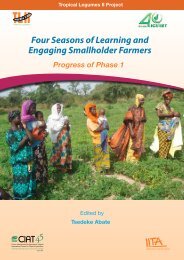Download - icrisat
Download - icrisat
Download - icrisat
Create successful ePaper yourself
Turn your PDF publications into a flip-book with our unique Google optimized e-Paper software.
46<br />
of purpose’ (heartquotes.net). Thoreau inspired by Walden, Wald inspired by his own elevated sense of purpose,<br />
if I may put it that way. Wald has simplified it well; his sentence of 17 words has 11 essential ones: Global shift,<br />
farm-based fuel, reduce, need, oil, slow, climate change. That’s what this is all about, isn’t it? That’s => more<br />
ethanol from farm crops => less oil from fossil fuels => less carbon dioxide from cars => less ozone depletion =><br />
less abrupt climate change. An act hard to follow, if not hard to swallow.<br />
Have faith in corn for ethanol: That could be the new Protestant ethic. Brown and other Yankee experts are afraid<br />
that the new ethic will cause corn and other food shortages in many states, because more farmers would plant<br />
more corn, plant less wheat, plant less soybeans. Wendy Wintersteen, Dean of the College of Agriculture, Iowa<br />
State U, says that this summer, ‘we will have areas of the state we would call corn deficient.’ But Keith Collins,<br />
Chief Economist of the US Department of Agriculture, reminds us that ‘the United States is paying farmers not to<br />
grow crops on 35 million acres, to prop up the value of corn.’ That is to say, theoretically, 14M ha can go into the<br />
growing of corn and wheat and cotton, so there shouldn’t be any corn deficit anywhere in the United States.<br />
What Collins is saying makes<br />
sense to me. But, I say, corn<br />
for ethanol is a thoroughly<br />
corny idea. Corny, as in<br />
insignificant. Corn is only<br />
a second-rate feedstock<br />
for ethanol. It’s more<br />
expensive to produce than,<br />
say, sweet sorghum.<br />
What Collins is saying makes sense to me. But, I say, corn for ethanol<br />
is a thoroughly corny idea. Corny, as in insignificant. Corn is only a<br />
second-rate feedstock for ethanol. It’s more expensive to produce<br />
than, say, sweet sorghum.<br />
Joe Jobe, Executive Director of the National Biodiesel Board, thinks<br />
differently. He says, ‘There’s a historical shift under way, not to grow<br />
more crops for energy and less for food, but to grow more for both.’<br />
By Jobe, amen to that! We don’t all have to eat corn. We can eat<br />
sorghum. Did you know that sugar is sweet but, as I have already<br />
written, sweet sorghum is sweeter? You better believe it. Heraldo<br />
Layaoen, a pioneer scientist-sorghum grower in the Philippines, says<br />
sugarcane has 14% sugar content, sweet sorghum has 23%<br />
(thesweetsorghuminitiative.wordpress.com).<br />
You don’t entertain the idea of eating sweet sorghum like you eat corn? No problem. If you are in India, you may<br />
be able to eat chicken and eat sweeter. That’s because the chicken wing you have in your hand may have come<br />
from a bird fed with sweet sorghum. Not necessarily tasting sweeter in the sense of sugar, but tasting nicer, more<br />
delicious. Satisfaction guaranteed.<br />
It is as if I have seen it myself. I read in her 2005 annual report that the International Crops Research Institute for<br />
the Semi-Arid Tropics (ICRISAT) has a project titled ‘Exploring marketing opportunities through a research, industry<br />
and users coalition: sorghum poultry feed.’ The report says (pages 16-17) that the coalition comprised ICRISAT, the<br />
Acharya NG Ranga Agricultural University (ANGRAU), Federation of Farmers Associations (FFA), Andhra Pradesh<br />
Poultry Federation (APPF), and Janaki Feeds. The aim: replace expensive corn in the feeds.<br />
Seeds For My Sweet

















